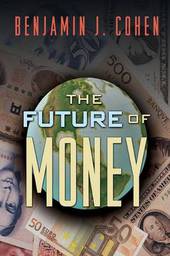
|
The Future of Money
Paperback / softback
Main Details
| Title |
The Future of Money
|
| Authors and Contributors |
By (author) Benjamin J. Cohen
|
| Physical Properties |
| Format:Paperback / softback | | Pages:320 | | Dimensions(mm): Height 235,Width 152 |
|
| ISBN/Barcode |
9780691116662
|
| Classifications | Dewey:332.042 |
|---|
| Audience | | Professional & Vocational | | Tertiary Education (US: College) | |
|---|
| Illustrations |
1 line illus. 6 tables.
|
|
Publishing Details |
| Publisher |
Princeton University Press
|
| Imprint |
Princeton University Press
|
| Publication Date |
22 January 2006 |
| Publication Country |
United States
|
Description
Is globalization leading us toward a world of fewer and fewer currencies and, consequently, simplified monetary management? Many specialists believe this is the case, as the territorial monopolies national governments have long claimed over money appears to be eroding. In The Future of Money, Benjamin Cohen argues that this view--which he calls the "Contraction Contention"--is wrong. Rigorously argued, written with extraordinary clarity, and thoroughly up-to-date, this book demonstrates that the global population of currencies is set to expand greatly, not contract, making monetary governance more difficult, not less. At the book's core is an innovative theoretical model for understanding the strategic preferences of states in monetary management. Should governments defend their traditional monetary sovereignty, or should they seek some kind of regional consolidation of currencies? The model offers two broad advances. First, whereas most scholarly work evaluates strategic options individually or in comparison to just one other alternative, this model emphasizes the three-dimensional nature of the decisions involved.Second, the model emphasizes degrees of currency regionalization as a central determinant of state preferences. Cohen also systematically explores the role of the private sector as an alternative source of money. The book concludes with two key policy proposals. First, fiscal policy should be resurrected as a tool of macroeconomic management, to offset the present-day erosion in the effectiveness of monetary policy. Second, the International Monetary Fund should more actively help coordinate the decentralized strategic decision-making of governments. The future of money will be perilous. But, by mapping out the alternative policies countries can follow, The Future of Money shows it need not be chaotic.
Author Biography
Benjamin J. Cohen is Louis G. Lancaster Professor of International Political Economy at the University of California, Santa Barbara. He is the author of nine previous books, including "Organizing the World's Money, In Whose Interest?", and "The Geography of Money".
Reviews"An informative discussion of various currency arrangements, from exclusive reliance on a national currency to bimonetarism to the adoption of foreign currency as official legal tender, touching on both academic and practical arguments for each."--Richard N. Cooper, Foreign Affairs "Cohen has produced yet another excellent volume on the political economy of international monetary affairs... Like most of Cohen's scholarship, [this book] displays the author's remarkable facility with the vast breadth of issues, theories, puzzles, and esoterica associated with monetary matters, as well as a confident command of monetary policy and history."--Jonathan Kirshner, Perspectives on Politics
|